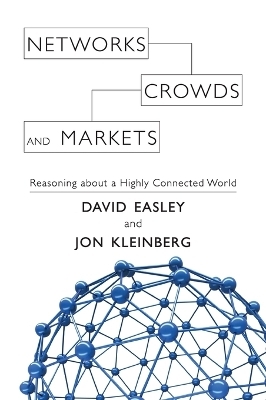
Networks, Crowds, and Markets
Cambridge University Press (Verlag)
978-0-521-19533-1 (ISBN)
Are all film stars linked to Kevin Bacon? Why do the stock markets rise and fall sharply on the strength of a vague rumour? How does gossip spread so quickly? Are we all related through six degrees of separation? There is a growing awareness of the complex networks that pervade modern society. We see them in the rapid growth of the internet, the ease of global communication, the swift spread of news and information, and in the way epidemics and financial crises develop with startling speed and intensity. This introductory book on the new science of networks takes an interdisciplinary approach, using economics, sociology, computing, information science and applied mathematics to address fundamental questions about the links that connect us, and the ways that our decisions can have consequences for others.
David Easley is the Henry Scarborough Professor of Social Science and a Professor of Economics at Cornell University. He was previously an Overseas Fellow of Churchill College, Cambridge. His research is in the fields of economics, finance, and decision theory. In economics, he focuses on learning, wealth dynamics, and natural selection in markets. In finance, his work focuses on market microstructure and asset pricing. In decision theory, he works on modeling decision making in complex environments. He is a Fellow of the Econometric Society and a member of the NASDAQ-OMX Economic Advisory Board. Jon Kleinberg is the Tisch University Professor in the Computer Science Department at Cornell University. He is a member of the National Academy of Engineering and the American Academy of Arts and Sciences. His research focuses on issues at the interface of networks and information, with an emphasis on the social and information networks that underpin the Web and other online media. He is the recipient of MacArthur, Packard, and Sloan Foundation Fellowships; the Nevanlinna Prize; the ACM-Infosys Foundation Award; and the National Academy of Sciences Award for Initiatives in Research.
1. Overview; Part I. Graph Theory and Social Networks: 2. Graphs; 3. Strong and weak ties; 4. Networks in their surrounding contexts; 5. Positive and negative relationships; Part II. Game Theory: 6. Games; 7. Evolutionary game theory; 8. Modeling network traffic using game theory; 9. Auctions; Part III. Markets and Strategic Interaction in Networks: 10. Matching markets; 11. Network models of markets with intermediaries; 12. Bargaining and power in networks; Part IV. Information Networks and the World Wide Web: 13. The structure of the Web; 14. Link analysis and Web search; 15. Sponsored search markets; Part V. Network Dynamics: Population Models: 16. Information cascades; 17. Network effects; 18. Power laws and rich-get-richer phenomena; Part VI. Network Dynamics: Structural Models: 19. Cascading behavior in networks; 20. The small-world phenomenon; 21. Epidemics; Part VII. Institutions and Aggregate Behavior: 22. Markets and information; 23. Voting; 24. Property.
| Erscheint lt. Verlag | 19.7.2010 |
|---|---|
| Zusatzinfo | Worked examples or Exercises; 4 Halftones, unspecified; 328 Line drawings, unspecified |
| Verlagsort | Cambridge |
| Sprache | englisch |
| Maße | 190 x 264 mm |
| Gewicht | 1310 g |
| Themenwelt | Mathematik / Informatik ► Informatik ► Netzwerke |
| Informatik ► Theorie / Studium ► Algorithmen | |
| Sozialwissenschaften ► Soziologie ► Allgemeines / Lexika | |
| Schlagworte | Netzwerke |
| ISBN-10 | 0-521-19533-0 / 0521195330 |
| ISBN-13 | 978-0-521-19533-1 / 9780521195331 |
| Zustand | Neuware |
| Informationen gemäß Produktsicherheitsverordnung (GPSR) | |
| Haben Sie eine Frage zum Produkt? |
aus dem Bereich


